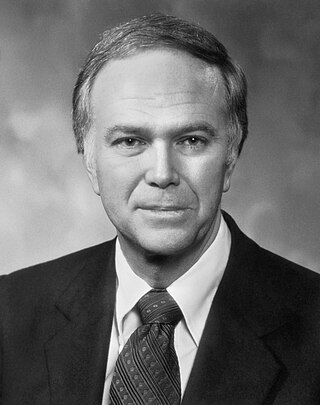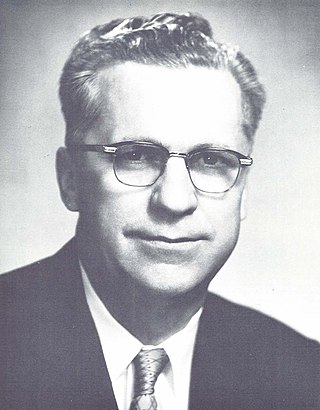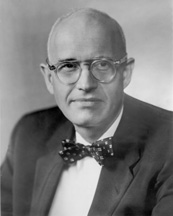
Robert William Packwood is an American retired lawyer and politician from Oregon and a member of the Republican Party. He resigned from the United States Senate, under threat of expulsion, in 1995 after allegations of sexual harassment, abuse and assault of women emerged.

Wayne Lyman Morse was an American attorney and United States Senator from Oregon. Morse is well known for opposing the Democratic Party’s leadership and for his opposition to the Vietnam War on constitutional grounds.

The 1974 United States Senate elections were held on November 5, with the 34 seats of Class 3 contested in regular elections. They occurred in the wake of the Watergate scandal, Richard M. Nixon's resignation from the presidency, and Gerald Ford's subsequent pardon of Nixon. Economic issues, specifically inflation and stagnation, were also a factor that contributed to Republican losses. As an immediate result of the November 1974 elections, Democrats made a net gain of three seats from the Republicans, as they defeated Republican incumbents in Colorado and Kentucky and picked up open seats in Florida and Vermont, while Republicans won the open seat in Nevada. Following the elections, at the beginning of the 94th U.S. Congress, the Democratic caucus controlled 60 seats, and the Republican caucus controlled 38 seats.

The 1966 United States Senate elections were elections on November 8, 1966, for the United States Senate which occurred midway through the second term of President Lyndon B. Johnson. The 33 seats of Class 2 were contested in regular elections. Special elections were also held to fill vacancies. With divisions in the Democratic base over the Vietnam War, and with the traditional mid-term advantage of the party not holding the presidency, the Republicans took three Democratic seats, thereby breaking Democrats' 2/3rds supermajority. Despite Republican gains, the balance remained overwhelmingly in favor of the Democrats, who retained a 64–36 majority. Democrats were further reduced to 63–37, following the death of Robert F. Kennedy in June 1968.

The 1960 United States Senate elections coincided with the election of John F. Kennedy as president on November 8, 1960. The 33 seats of Class 2 were contested in regular elections. A special election was also held on June 28, 1960, for a mid-term vacancy in North Dakota where Democrats flipped a seat to expand their majority to 66–34. As Majority Leader Lyndon Johnson was elected Vice President, Mike Mansfield became the new majority leader.

Robert Blackford Duncan was an American politician from the state of Oregon. A Democrat, he served multiple terms in the Oregon Legislative Assembly and as a U.S. congressman from Oregon. In the Oregon House of Representatives he served as speaker for four years, and in the U.S. House he represented two different districts. The Illinois native and World War II veteran ran three unsuccessful campaigns to be elected to the U.S. Senate.

Rufus Cecil Holman was an American politician and businessman who served as a United States senator for a single term during World War II. He was an officer in the Ku Klux Klan during the 1920s, then served as Oregon State Treasurer. He was a member of the Multnomah County Board of Commissioners.

Maurine Neuberger-Solomon, best known as Maurine Neuberger was an American politician who served as a United States senator for the State of Oregon from November 1960 to January 1967. She was the fourth woman elected to the United States Senate and the tenth woman to serve in the body. She and her husband, Richard L. Neuberger, are regarded as the U.S. Senate's first husband-and-wife legislative team. To date, she is the only woman elected to the U.S. Senate from Oregon.

Donald Leroy Bonker was an American politician. A member of the Democratic Party, he served as a member of the United States House of Representatives from 1975 to 1989, representing Washington's third Congressional district.

Hall Stoner Lusk was an American jurist in the state of Oregon. A native of the District of Columbia, he became a judge in Oregon, serving in both the Oregon circuit courts and later on the Oregon Supreme Court, including time as its chief justice. A Democrat, he was appointed to the United States Senate for eight months in 1960 after the death of sitting Senator Richard L. Neuberger.

Elmo Everett Smith was an American Republican politician who served as the 27th Governor of Oregon from 1956 to 1957.

Monroe Mark Sweetland was an American politician in the state of Oregon. A native of the state, he served in both houses of the Oregon Legislative Assembly starting in 1953 for a total of ten years. A Democrat, he also twice ran and lost bids to serve as the Oregon Secretary of State and was a Democratic National Committeeman. Sweetland later served on the staff of the National Education Association, supporting passage of the Bilingual Education Act of 1968.

The 1974 United States Senate election in Oregon was held on November 5, 1974. Incumbent Republican U.S. Senator Bob Packwood won re-election to a second term. Betty Roberts was chosen to replace former U.S. Senator Wayne Morse, who won the Democratic primary but died before the general election.
Penelope Ann "Penny" Gross was a member of the Fairfax County, Virginia Board of Supervisors. She represented the Mason district, which encompasses Annandale and other unincorporated areas of Fairfax County near the city of Falls Church. She was the Vice Chairman of the board, serving under Chairman Jeff McKay.
Fariborz Maseeh is an Iranian-born Iranian-American engineer who works in the field of micro-electro mechanical systems (MEMS). He founded IntelliSense in 1991 and sold it in 2000. He is the founder and managing principal of Surlamer LLC, an investment management firm managing investments in private companies, a diversified portfolio of commercial and residential real estate, and several proprietary traded hedge funds. He is the founder of Kids Institute for Development and Advancement (KiDA), an Irvine, California, treatment clinic and education facility for autistic children. He is the founder of Orbitron LP, a global macro long-short hedge fund. He is the founder and president of The Massiah Foundation, a charitable organization..

The 1966 Oregon United States Senate election was held on November 6, 1966 to select the U.S. Senator from the state of Oregon. Incumbent Senator Maurine Brown Neuberger did not seek re-election. Held during the escalation of United States involvement of the Vietnam War, the race was between Republican candidate and incumbent Governor of Oregon Mark Hatfield, who opposed the war, and Democratic congressman Robert B. Duncan, who supported the war. In an unusual move, Oregon's other Senator, Democrat Wayne Morse, who also opposed the war, crossed party lines to endorse Hatfield, who won in a close election, his first of five terms in the United States Senate.

Fariborz Maseeh Hall is a building on the Portland State University campus in Portland, Oregon, United States.
Sidney I. Lezak was an American lawyer who served as the United States Attorney for the District of Oregon from 1961 to 1982. Appointed acting U.S. Attorney by John F. Kennedy in 1961, Lezak resigned in 1982.

The 1960 United States Senate elections in Oregon took place on November 8, 1960.




















